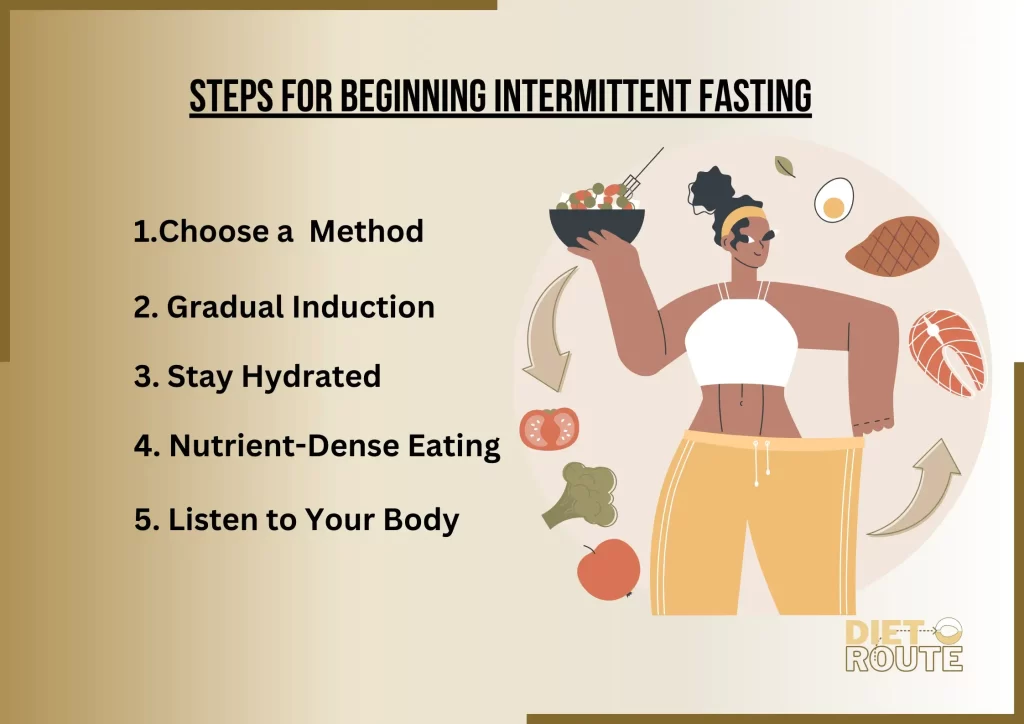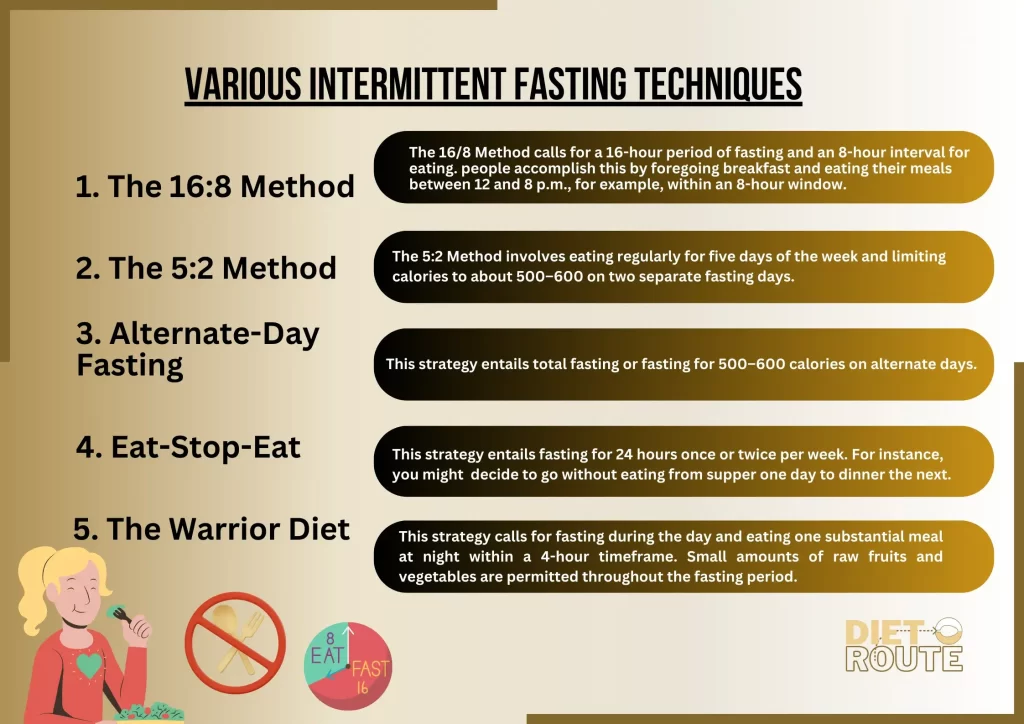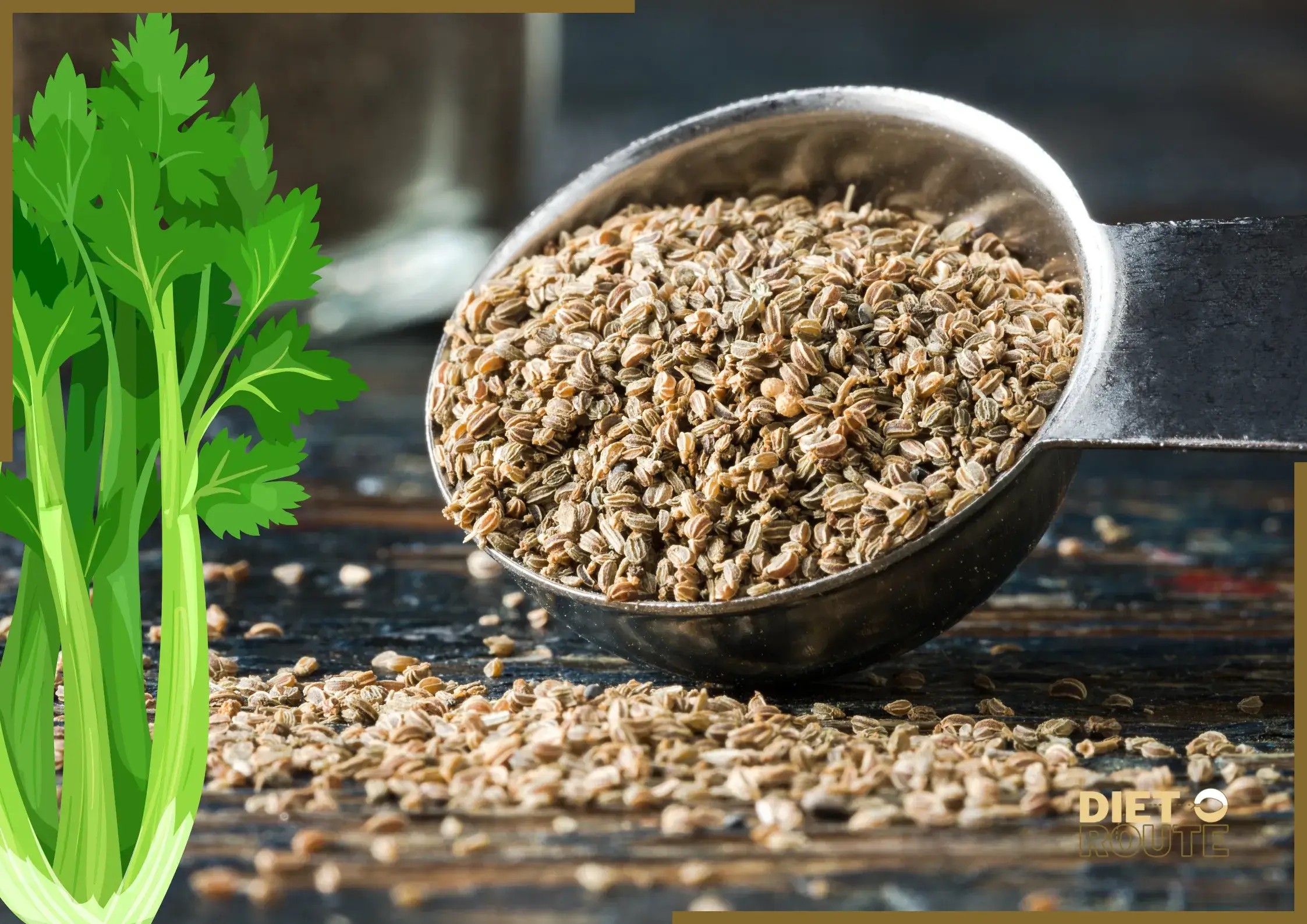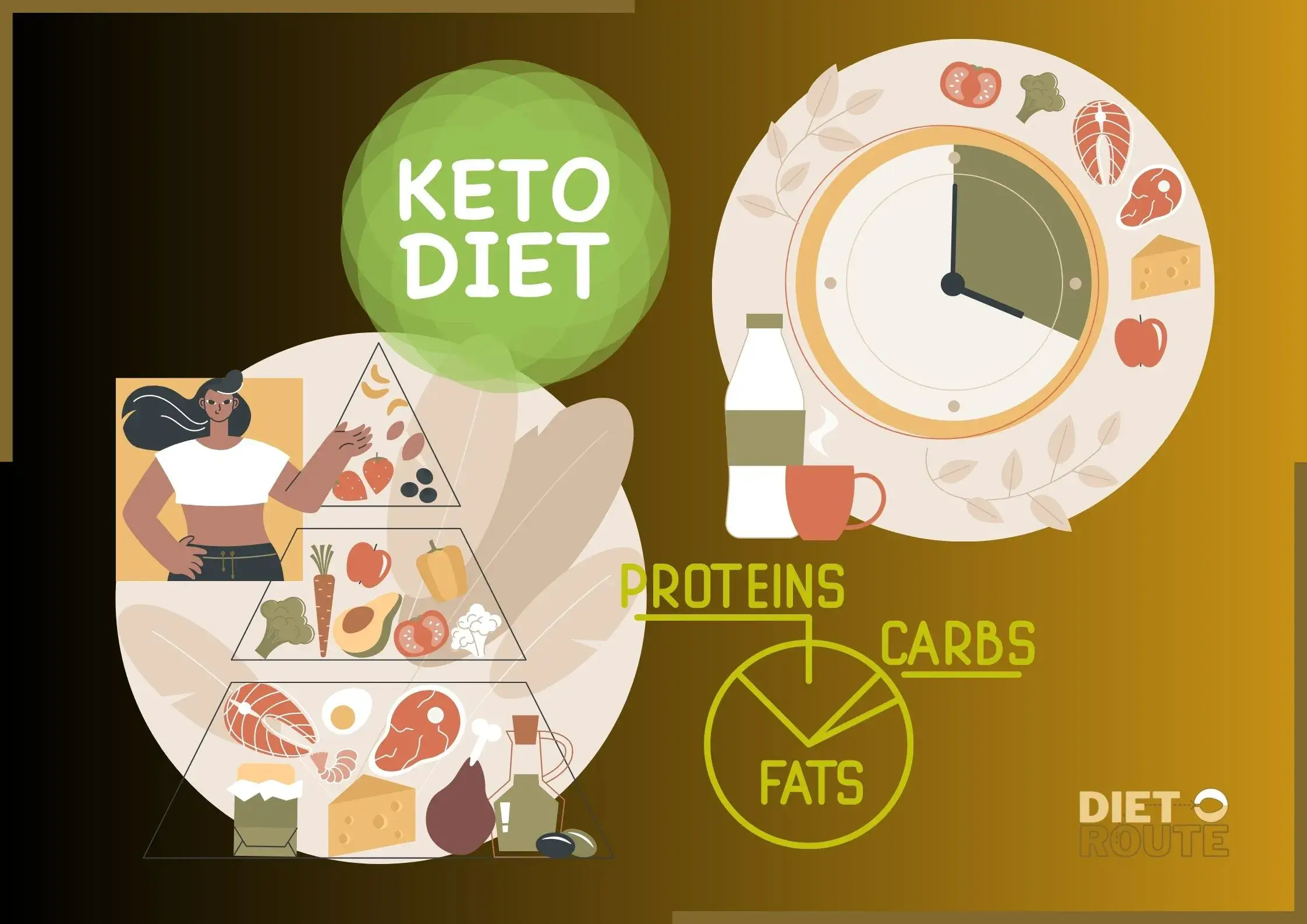“Intermittent fasting is not a form of eating plan; it is a way of life that improves health in many ways. Time-restricted eating boosts health and longevity by stimulating the body’s innate capacity for repair and renewal.” – Diet Route
Table of Contents
Introduction
It’s time to change our focus from fast cures and fad diets to a sustainable and effective approach to weight management and greater health. Recent years have seen a huge increase in the popularity of intermittent fasting, and for good reason. By incorporating periods of fasting and eating within set time intervals, this dietary approach goes beyond conventional methods of dieting. In this article, we’ll look into the idea of intermittent fasting, examine the scientific support for its benefits, and learn why it’s a more sustainable option than a rigorous diet. Let’s put an end to diets and start a journey towards improved well-being.
Understanding Intermittent Fasting

A simple and unrestrictive diet is not required for intermittent fasting. Instead, it is a pattern of eating that alternates between eating and fasting times. Intermittent fasting focuses on when you eat rather than what you eat, unlike conventional diets.
The fundamental idea behind it is to schedule calorie-free windows of time, followed by eating times. There are several ways to accomplish this, but the most common methods require daily or alternate-day fasting intervals.
The Basis of Intermittent Fasting in Science

Due to its potential health benefits, intermittent fasting has drawn the attention of researchers and medical professionals. At the cellular and molecular levels, our bodies undergo a number of changes when we fast.
An important modification is an increase in autophagy. In the autophagic process, damaged cells are digested and recycled. By removing waste and pollutants, this cellular cleansing procedure encourages cellular renewal and better overall health.
Hormone levels in the body are also affected by intermittent fasting. Insulin levels fall during fasting periods, which increases fat burning. Growth hormone levels rise, which helps with muscle building and fat loss. Fasting also causes gene expression modifications that may improve longevity and illness prevention.
Additionally, it encourages ketosis. In the metabolic state of ketosis, fat serves as the body’s main energy source rather than glucose. Significant weight loss and improved metabolic health may result from this.
Numerous benefits have been demonstrated by research. It has been linked to reduced inflammation, greater cognitive function, improved insulin sensitivity, weight loss, and even a lower risk of developing chronic illnesses like heart disease, type 2 diabetes, and some cancers.
We can appreciate why intermittent fasting has become a well-liked and sustainable method for achieving higher health and well-being by comprehending the science behind it. In the parts that follow, we will discuss the specific health benefits of intermittent fasting as well as how to successfully incorporate it into your way of life.
Scientific Benefits of Intermittent Fasting for Health

Beyond merely weight loss, intermittent fasting has many additional health benefits. Let’s examine some of the main benefits linked to this eating style:
1. Intermittent fasting can be an effective method for losing excess weight. You naturally consume fewer calories when you limit your eating window, creating a calorie deficit. Additionally, fasting helps with weight loss by promoting fat burning and raising the metabolic rate.
2. Intermittent fasting has been demonstrated to enhance insulin sensitivity, which is essential for maintaining stable blood sugar levels. The likelihood of insulin resistance and type 2 diabetes is decreased by increasing insulin sensitivity, which makes the body more effective at utilising carbs and conserving calories.
3. Heart disease, arthritis, and some malignancies are just a few of the health issues that chronic inflammation contributes to. It has been discovered that intermittent fasting lowers inflammatory indicators in the body, improving overall health and lowering the risk of chronic diseases.
4. The protein brain-derived neurotrophic factor (BDNF), which supports the growth and protection of brain cells, is produced in response to fasting. Increased BDNF levels are linked to better mood control, improved cognitive function, and defence against neurodegenerative conditions like Parkinson’s and Alzheimer’s.
5. As was already noted, intermittent fasting encourages the process of autophagy, which helps rid the body of dead cells and waste. A decreased risk of age-related illnesses and improved longevity have both been attributed to this cellular cleansing.
Scientific Relationship Between Intermittent Fasting and Weight Loss

The impact of intermittent fasting on weight loss is one of its most significant benefits. You can achieve sustainable and long-term weight management by using this eating plan. How intermittent fasting can help you lose those excess pounds is as follows:
1.Due to the inherent time constraints imposed by intermittent fasting, your overall calorie intake is reduced. As it forces the body to use stored fat for energy, this calorie deficit is crucial for weight loss.
2. During periods of fasting, the body uses up its glycogen reserves and starts burning fat for energy. This metabolic change encourages fat burning and makes weight loss easier.
3. Intermittent fasting has been demonstrated to boost metabolic rates. Regular breaks for your digestive system will increase metabolic effectiveness and maximise calorie burning.
4. Lean muscle mass retention: Unlike conventional calorie-restricted diets, intermittent fasting aids in maintaining lean muscle mass. This is essential for preserving a healthy metabolism and avoiding muscle loss while losing weight.
Steps for Beginning Intermittent Fasting

Here are some things to do to get started if you’re ready to enjoy the benefits of intermittent fasting:
1. Choose a method:
The 16/8 method (16 hours of fasting and an 8-hour eating window) and the 5:2 method (eating normally for five days and limiting calories on two non-consecutive days) are two examples of the many different intermittent fasting methods available. Choose a strategy that fits your lifestyle and tastes.
2. Gradual Induction:
It’s advisable to ease into fasting gradually if you’re new to it. Start by prolonging your nighttime fasting period by a couple of hours, then gradually lengthen it over time.
3. Stay Hydrated:
It’s crucial to keep hydrated when fasting. To quell hunger and keep hydrated, consume plenty of water, herbal tea, or black coffee.
4. Nutrient-Dense Eating:
When it comes time to break your fast, concentrate on eating nutrient-dense foods. To promote overall health and wellbeing, include lots of fruits, vegetables, whole grains, lean meats, and healthy fats in your meals.
5. Listen to Your Body:
Pay attention to your body’s signals and modify your fasting schedule as necessary by listening to your body. Finding a fasting schedule that works for you is crucial because everyone has different demands and tolerances.
Remember that not everyone should practise intermittent fasting, especially if they have a history of eating disorders or certain medical issues. Before beginning this eating pattern, speak with a health care professional if you have any concerns.
Various Intermittent Fasting Techniques

Intermittent fasting gives you the freedom to select a strategy that fits your lifestyle and objectives. Some well-liked methods include:
1. The 16:8 Method:
The 16/8 Method calls for a 16-hour period of fasting and an 8-hour interval for eating. Most people accomplish this by foregoing breakfast and eating their meals between 12 and 8 p.m., for example, within an 8-hour window.
2. The 5:2 Method:
The 5:2 Method involves eating regularly for five days of the week and limiting calories to about 500–600 on two separate fasting days.
3. Alternate-Day Fasting:
This strategy entails total fasting or fasting for 500–600 calories on alternate days.
4. Eat-Stop-Eat:
This strategy entails fasting for 24 hours once or twice per week. For instance, you might decide to go without eating from supper one day to dinner the next.
5. The Warrior Diet:
This strategy calls for fasting during the day and eating one substantial meal at night within a 4-hour timeframe. Small amounts of raw fruits and vegetables are permitted throughout the fasting period.
Pick a strategy that works with your schedule, preferences, and objectives. Finding a long-term, sustainable fasting schedule is crucial.
Myths Associated With Intermittent Fasting
Fasting intermittently has its fair share of myths and misconceptions, just like any other well-liked health fad. Let’s dispel some of the most common myths about intermittent fasting:
1. Myth: Intermittent fasting slows metabolism. In reality, it can boost metabolism and aid in weight loss. As long as you eat enough calories throughout your eating window, it doesn’t significantly slow down your metabolism.
2. Myth: Fasting Causes Muscle Loss Intermittent fasting, when done properly, can help maintain lean muscle mass. It can even encourage muscular growth when combined with resistance training and enough protein consumption.
3. Myth: Intermittent fasting results in nutritional deficits. Intermittent fasting does not necessarily result in nutritional deficiencies. During your eating window, it’s critical to concentrate on eating a well-balanced diet full of fruits, vegetables, complete grains, and lean proteins.
4. Myth: While many people report better energy levels and improved mental clarity during fasting periods, fasting is initially associated with a negative adjustment period.
Considerations and Precautions
There are a few safeguards and considerations to bear in mind, even though intermittent fasting is generally safe and advantageous for most people:
1. Individual differences may affect how each person reacts to intermittent fasting. This eating pattern may be ideal for some people while being difficult for others. Pay attention to your body’s signals and modify your fasting schedule as needed.
2. Electrolyte balance and hydration are important to maintain during fasting times in order to prevent electrolyte imbalance. To support hydration, consume plenty of water and think about incorporating electrolyte-rich foods or supplements.
3. Consult your health care professional before beginning the fasting if you have any underlying medical concerns, take drugs, are pregnant, or are nursing.
4. Individuals with a history of disordered eating or problematic interactions with food should proceed with caution while attempting intermittent fasting. Prioritise your overall well-being and seek advice from a health care professional if necessary.
Fasting Sporadically for Long-Term Health
Intermittent fasting is a lifestyle choice with long-term health benefits, not a quick fix. Here are some of the reasons why it might be a sustainable solution:
1. When compared to rigorous diets, intermittent fasting increases the likelihood of adherence since it is flexible and can be tailored to accommodate different schedules and preferences.
2. By emphasising overall calorie balance and fat burning while retaining muscle mass, intermittent fasting, in contrast to crash diets, encourages sustainable weight loss.
3. This fasting encourages a balanced and attentive eating style. It promotes conscious eating and discourages mindless nibbling by establishing defined eating windows.
4. This fasting has been linked to improved insulin sensitivity, less inflammation, and a lower risk of chronic diseases, all of which are beneficial for long-term health and wellness.
As with any diet change, it’s crucial to find the method that works for you and to speak with a health care professional if you have any concerns or certain health conditions.
In a Nut Shell
In conclusion, intermittent fasting is an effective and sustainable method for enhancing overall health and controlling weight. This eating pattern has grown in popularity due to its multiple benefits, which include periods of fasting and eating within set time constraints.
According to studies, such fasting boosts insulin sensitivity, lowers inflammation, and supports weight loss by promoting cellular rejuvenation through mechanisms like autophagy. Additionally, it improves brain function and lowers the risk of chronic diseases, both of which are beneficial for long-term health.
It’s crucial to start intermittent fasting with a strategy that fits your lifestyle and ease into the practise gradually. Key considerations include drinking plenty of water, eating nutrient-dense foods when you are hungry, and paying attention to your body’s cues.
Although there are certain myths and misconceptions about it, it’s crucial to rely on information that’s supported by facts. When used properly, the strategy does not slow down metabolism, induce muscle loss, or result in nutritional inadequacies.
However, it’s imperative to use caution and take individual differences into account. A healthcare professional should be consulted, especially if you have underlying medical issues, take medication, or have a history of disordered eating.
The article about intermittent fasting by Diet Route offers a thorough knowledge of the idea, its science-backed benefits, intermittent fasting benefits, and dispelling common myths. For those looking to adopt intermittent fasting as a long-term strategy for improved wellness, it is an invaluable resource.
A healthier relationship with food, improved metabolic health, and sustainable weight management are all benefits of adopting intermittent fasting as a way of life. Intermittent fasting may be a transformative and fulfilling experience if a balanced diet is prioritised, individual needs are met, and the journey towards better health is enjoyed.
Key TaKeaways
1. An eating pattern known as intermittent fasting emphasises when you eat rather than what you eat, cycling back and forth between periods of fasting and eating.
2. It encourages cell renewal, greater insulin sensitivity, less inflammation, weight loss, improved brain function, and a lower risk of chronic diseases.
3. The 16/8 approach, the 5:2 method, alternate-day fasting, eat-stop-eat, and the Warrior Diet are a few examples of several methods of intermittent fasting.
4. For long-term health and weight management, intermittent fasting may be a sustainable approach.
5. It’s critical to pay attention to your body, remain hydrated, eat nutrient-dense foods, and seek professional medical advice as necessary.
6. The notion that intermittent fasting slows down metabolism, results in muscle loss, and causes nutritional shortages is among the most prevalent myths surrounding it.
7. Individual variances should be taken into account, and people with health issues or a history of disordered eating should proceed with caution.
8. The practise of intermittent fasting increases overall wellbeing and encourages a healthier relationship with food.
9. Weight management, improved metabolic health, and improved overall wellness can all be achieved by adopting intermittent fasting as a way of life.
Frequently Asked Questions (FAQs)
1. Is intermittent fasting appropriate for all people?
Everyone may not be a good candidate for it, especially those with particular medical issues or dietary requirements. Before beginning any new eating routine or making any adjustments to your diet, it is advised to speak with a healthcare professional.
2. Will my metabolism be slowed down by intermittent fasting?
Contrary to popular belief, intermittent fasting has little effect on metabolism. By encouraging fat burning and maintaining lean muscle mass, it can even have a positive impact on metabolic rate. Individual responses may differ, so it’s important to pay attention to your body and modify as necessary.
3. I’m intermittently fasting. Can I still exercise?
Yes, you can exercise while following the plan. In general, it is safe to keep up your regular exercise schedule. However, depending on their fasting pattern and how their body reacts, some people may find it advantageous to modify the timing or intensity of their exercise. During exercise, remember to stay hydrated and pay attention to your body.
4. Will intermittent fasting cause me to lose muscle mass?
It can help maintain muscle mass when done properly. You can maintain muscle maintenance and even encourage muscle growth by combining your fasting with resistance training and getting enough protein during meal windows. To satisfy your body’s protein requirements, it’s critical to give nutrient-dense foods top priority.
5. Can intermittent fasting aid in the loss of weight?
Yes, in fact, be an effective method for weight loss. Your body burns stored fat for energy when you restrict your eating window to a calorie deficit. In order to aid in weight loss, it can also boost metabolism and encourage fat burning. Individual results could differ, though, and consistency is essential for long-term success.
6. What foods may I eat when fasting?
It is advised to consume zero or very few calories during fasting. Drink only water, herbal tea, unflavored black coffee, or other calorie-free liquids. The metabolic benefits can be disrupted by consuming any calories during the fasting phase, which can also end the fast.
7. How long does it take for intermittent fasting to produce results?
Depending on a number of variables, including your starting point, body composition, adherence to the regimen, and overall fasting habits, the time it takes to achieve results with intermittent fasting can vary. While visible weight loss or other significant changes may take several weeks or longer, some people may notice changes in their energy levels or ability to manage their appetites rather quickly.
8. Can insulin sensitivity be increased by intermittent fasting?
It has been proven that intermittent fasting increases insulin sensitivity. It increases the body’s reaction to insulin by allowing for regular fasting periods and helping control blood sugar levels. Managing insulin resistance and lowering the risk of type 2 diabetes can both be helped by this.
9. Are intermittent fasting’s risks or negative consequences known?
The majority of healthy people are generally regarded as safe during intermittent fasting. Some individuals, particularly during the early adjustment period, may, however, experience transient adverse effects like hunger, cravings, irritability, or difficulties concentrating. During eating periods, it’s crucial to pay attention to your body, remain hydrated, and make sure you’re getting the right nourishment.
10. Before I start intermittent fasting, should I speak with a health care professional?
If you have any underlying health issues, take medication, or have a history of disordered eating, it is best to speak with a healthcare professional. They can offer you individualised advice, determine whether intermittent fasting is a good fit for you, and assist you in creating a fasting schedule that suits your particular requirements and objectives.





